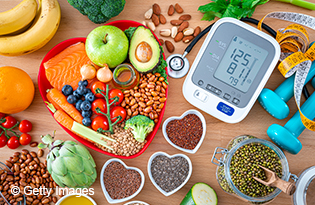For a healthy life, start with your heart
2/3/2025 by Allison Ducharme-Smith, M.D.
 This time of year, a common question that comes up is, "What can I do to improve my health?" It can seem daunting to figure out where to start. Fortunately, the American Heart Association (AHA) created a simple Life's Essential 8 map to guide us on a healthy lifestyle. The eight components we can tackle are included below:
This time of year, a common question that comes up is, "What can I do to improve my health?" It can seem daunting to figure out where to start. Fortunately, the American Heart Association (AHA) created a simple Life's Essential 8 map to guide us on a healthy lifestyle. The eight components we can tackle are included below:1) Eat Better
Eating healthy is an important part of improving our health and staying healthy. The AHA recommends making smart choices to build an overall healthy dietary pattern. There's a right number of calories for you, based on your age, activity level, and whether you're trying to lose, gain or maintain your weight. You can improve your health by reading nutrition labels, watching your calorie intake, cooking at home, aiming for vegetables and whole grains, and avoiding processed foods.
2) Be More Active
Get moving! Adults should get about 2.5 hours of moderate-intensity activity per week. Moderate-level physical activity means breaking a sweat and having difficulty maintaining an entire conversation during activity. Kids should have about 1 hour of activity every day (including play and structured activities).
3) Quit Tobacco
4) Get Healthy Sleep
The newest recommendation is to get adequate sleep. Most adults need 7-9 hours of sleep per night. Sleep is essential to improve your health, promote healing and reduce your risk of chronic diseases.
5) Manage Weight
Staying within a healthy weight range for your body type is essential to keeping your heart, brain and skeleton happy. Understanding your calorie intake and activity level is important to help you identify the changes you want to make.
It is essential to understand your body mass index (BMI), which is a numerical value of your weight relative to your height, and it can help you know if you're at a healthy weight or need to lose weight. Optimal BMI is less than 25, but less than 18.5 is considered underweight.
6) Control Cholesterol
Cholesterol is a fat substance that comes from two sources — our body and our diet. There are two types of cholesterol: low-density lipoprotein, or LDL ("bad" cholesterol), and high-density protein, or HDL ("good" cholesterol). While the HDL ("good") cholesterol protects our artery walls, the LDL ("bad") cholesterol sticks to them, contributing to plaque build-up, which can clog our arteries. It is important to control our cholesterol levels to prevent plaque build-up, which leads to heart disease and stroke.
7) Manage Blood Sugar
The carbohydrates and sugars we eat turn into glucose (sugar) in the stomach and digestive system. This glucose then enters the bloodstream. Insulin is a hormone secreted by our pancreas that lowers blood glucose by helping cells take it in. With diabetes, glucose builds up in the bloodstream because cells no longer take it in as effectively. This can be due to genetics, increased weight and our diets. These high blood sugar levels can damage the heart, kidneys, eyes and nerves over time. That's why keeping our blood sugar at a normal level is important.
8) Manage Blood Pressure
Our blood pressure is made up of two numbers: the systolic (higher) number measures the pressure in the arteries during the heartbeat, and the diastolic (lower) number measures the pressure in the arteries when the heart is resting between beats. Normal is <120/<80. High blood pressure levels strain and pressure the heart, arteries and kidneys over time. Everyone's levels fluctuate during the day, but it's important to know your range and maintain control of your blood pressure.
People with great adherence to the ideal Life's Essential 8 metrics had an over 60% reduced risk for heart-related death compared to people without perfect metrics. The benefits of these Life's Essential 8 metrics go beyond the heart — they can also help you reduce your risk of other chronic diseases. If you can achieve each of these metrics, patients were found to have:
- 20% lower risk for cancer.
- 62% lower risk for chronic kidney disease.
- 43% lower risk for pneumonia.
- 49% lower risk for chronic obstructive pulmonary disease (COPD).
If you'd like to learn more and discover how to improve your health, visit the Life's Essential 8 | American Heart Association webpage. Talk to your healthcare clinician about how you can optimize your health today!
Allison Ducharme-Smith, M.D., is a physician in Primary Care in Rochester and Kasson's Division of Community Internal Medicine, Geriatrics and Palliative Care and practices at Mayo Family Clinic Northeast in Rochester. Her interests include preventive medicine, women's health, chronic disease management and medical education.
